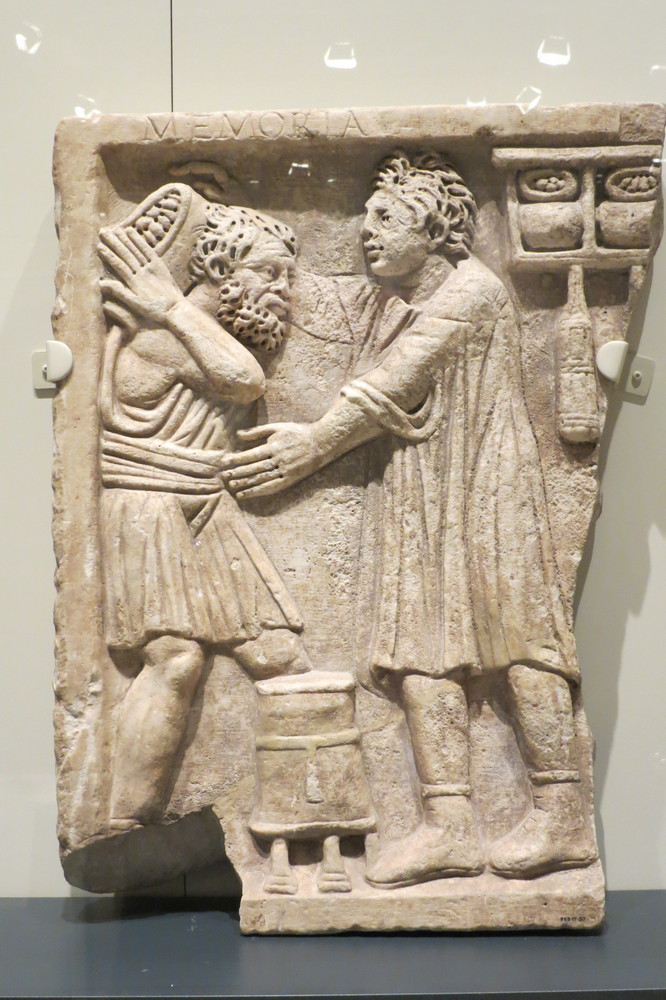RS18: Paul’s Understanding of Spirit
A: It’s been several months since you and I have had one of these conversations. Thanks for picking up the discussion again.
J: No problem. It’s been a busy few months for everyone.
A: Yeah. I’ve had an awful time at work since the beginning of May. The current financial climate is affecting people’s brains in unusual ways. The owners of the business where I work aren’t willing to take responsibility for mistakes they’ve made over the past few years, and now those mistakes are coming back to haunt them. Only they don’t want to blame themselves. So they’ve been blaming their long-time staff members — the same staff members whose suggestions they ignored when it would have done some good! Is this normal? Is it normal for business owners to shoot themselves in the foot — and the head — this way?
J: Unfortunately, it’s extremely common. But it’s not new. It’s not a new problem. And it’s not limited to businesses that deal in ordinary goods and services. Religious businesses fall prey to the same issues of narcissism and lack of accountability.
A: You mean . . . churches? That kind of religious business?
J: Could be. But religion is a huge business world-wide. Always has been. So the same “boom or bust” cycles that are evident in world financial markets today have always existed in the profitable world of religious marketing. Religious marketing is a business like any other. It’s not “separate” or “sacred” simply because the item being bought and sold is God.
A: Ouch. That makes God sound like a shampoo brand.
J (shrugging): In the early church founded by the apostle Paul, God is a shampoo brand. I’m the conditioner that smoothes out the tangles. Paul is the famous face who rakes in a few extra bucks by hawking the brand to a credulous audience.
A: But a shampoo brand? Isn’t that a bit . . . crass?
J: As a metaphor, it’s not very dignified or sacred, is it?
A: No.
J: Nonetheless, when you strip away all the lies and circular arguments and cliches, and look at Paul’s claims about God — and me — in the cold, hard light of reality, you’re left with the fact that Paul is selling soap. A very fancy form of soap, to be sure, but soap nonetheless. “Buy this soap so you’ll be clean enough to escape Hell and pass inspection at the entrance to Heaven.” This is what Paul is selling.
A: But . . . I can see the link between Paul’s sin — “being dirty” — and Paul’s salvation — “getting clean.” But how is God the soap, the shampoo? How can a person buy God the way a person buys a bar of soap?
J: Ah. Well, that’s the important part. In Paul’s theology, and in the theology of the Essenes who highly influenced Paul’s beliefs, God is the powerful Creator of Heaven and Earth, but God himself isn’t the highest authority. God is subject to an even higher force: the power of Cosmic Law. Paul calls this Cosmic Law by a name that’s now interpreted in a way that makes his original meaning hard to see. Paul calls the Law “Spirit.”
A: What?
J: Paul’s theology pays tribute to God, and tries to insert a brand-friendly Saviour into the mix (Jesus Christ), but the primary focus is always Spirit. In Greek, pneuma. For Paul, Spirit is an anthropomorphic cloud of knowing that is literally the breath — the life — of all Creation. The in-and-out breath of pure energy, pure life force, pure power that can be trapped and used if properly understood. Pneuma is a higher force than John’s Logos (Word). It’s a higher force than God himself. God is pure Mind. God is pure Mind and Jesus is pure Word. Both are sacred mystical forces, and both are worthy of attention, in Paul’s estimation. But neither Mind nor Word is the ultimate source of cleansing and purity and salvation. The ultimate source of power is Cosmic Law — Spirit — to which even God and Jesus Christ must bow. He who knows the Law in its purest form knows how to force God and Jesus Christ to obey his wishes. He who knows the Law can “buy” God like a bar of soap and force God to cleanse him and let him into Heaven. It’s simply a matter of being smart enough to make the Law work to your benefit.
A: That’s so grasping, so greedy, so arrogant and narcissistic. That’s not faith — that’s human greed at its worst.
J: Yes. It’s impossible to overstate the interconnection between narcissism and belief in occult magic.
A: How did we get onto the topic of occult magic?
J: Paul, the founder of Pauline Christianity, believed deeply in occult magic. He was teaching his followers how to practise his own form of occult magic, how to recognise and control the forces of nature, how to gain control over life and death, how to force Jesus Christ and God to obey the contract laws of the universe, how to secure a place on the ladder of spiritual ascent that will lead through all the levels of Heaven until mystical union with the cloud of knowing is one day accomplished.
A: Is any of this in the Bible?
J: It’s all in the Bible. A detailed examination of Paul’s First Letter to the Corinthians reveals a bumper crop of occult teachings that are founded on his belief in the invincibility and inviolability of contract law.
A: So there’s a connection between contract law and occult magic?
J: Absolutely. If there’s no contract law governing all cause and effect in the universe, then there’s no basis for occult magic. Occult magic is based on the clear and logical belief that “effect” consistently follows “cause.” If you can figure out “the cause” — that is, the hidden cosmic law that’s operating behind the scenes — then you can manipulate “the cause” to create a controlled “effect.” It’s straightforward classical physics. It’s all very logical. Occult magic and alchemy are both founded on highly logical principles. Both are also Materialist philosophies, philosophies that rely entirely on Cause and Effect principles, and may or may not include a belief in God. Faith in God is not required as part of a successful Materialist philosophy. Only confidence in humanity’s ability to understand and control the Laws of Cause and Effect is required.
A: Except the universe doesn’t actually operate according to simple Newtonian laws.
J: True. But don’t tell the narcissists this. No narcissistic wants to hear he’s not in charge.
A: So Paul believed he was in charge? He believed he was so clever he could actually control the forces of nature through his occult rituals?
J: That was the point of his new religion. The point was NOT to teach people how to be in relationship with God. The point was to teach people how to purify themselves so Spirit would be forced to give them “special gifts” in accordance with divine contract law.
A: You’ve said before that Paul hated and feared your teachings and wanted to undermine them. So if he feared you so much, why would he drag you into his new religion? Why would he name you as Saviour and insist his followers invoke your name to achieve salvation?
J: You’ve stumbled onto it right there. It’s all about name magic.
A: Name magic?
J: The deeply occult belief that if you can correctly name an entity, you can control that entity. It’s part of the belief in the law of cause and effect. In this case, there’s a belief that names have great power, that the true name spoken aloud around certain rituals can force a powerful figure to appear from the Heavens and obey the wishes of a human being. Paul feared me, but he also believed I had hidden knowledge about God that I could be forced to reveal to him and his followers if he correctly named me as the Christ (Messiah or Anointed One).
A: Did it work?
J (laughing): Not a chance. For starters, I wasn’t the Christ, and never claimed to be. For another, I have free will, and nothing any Christian has ever said or done has held any power over me or any other angel. And for another, magical thinking and occult rituals belong within the sphere of major mental illness in human beings, so angels DO NOT RESPOND to any prayers or beliefs grounded in occult magic.
A: Including the Eucharist that Paul instituted?
J: Yes. Communion wafers should come with a warning tag on them: “Belief in transubstantiation will guarantee you a seat on the slow train to redemption and healing.” Angels can’t abide the occult intent of Paul’s original Eucharist ritual. It’s a version of selling you divine soap to clean your dirty innards. And the soap they’re selling is the body and blood of a divine being who’s being named, then eaten, then controlled from inside your “heart” so you can get special gifts. How gross is that?
A: This is one reason why I’ve stopped going to church. I just can’t handle the abusive way God is being treated any longer.

















